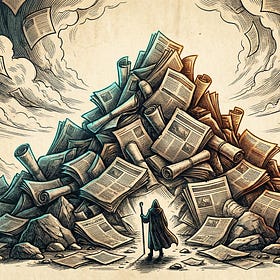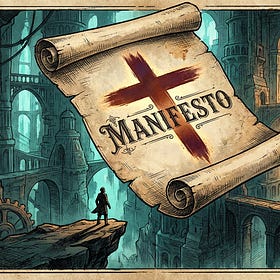Who Wants to Read for Four Hours a Day? I Do.
Steal my daily deep dive. I’ll arm you with what actually matters for thriving in the age of AI. I’ll do the reading. You do the building.
The CEO Who Read Four Hours a Day
The former CEO of Haier read and reflected for four hours every day. He transformed a monolith into 3,000 micro-enterprises. I hope to do the same—and sharing what I find.
One of the most inspiring people I've ever met was Zhang Ruimin, the former CEO of Haier, who wrote the foreword to the Chinese translation of my book Management 3.0. When he invited me to Qingdao, China, for a workshop with his managers, the company had just transformed from a traditional, hierarchical monolith into a flat network of 3,000 micro-enterprises. Since then, the company has achieved stellar annual growth and Mr. Zhang has gone down in the history books as the inventor of RenDanHeYi, one of the most progressive management philosophies in the world.
What was Mr. Zhang's secret to his success?
Four hours of reading and reflection every day.
Why Deep Reading Matters for Leaders in the Age of AI
How many CEOs do you know who spend their time reading and reflecting for four hours a day? My guess is not many. It's no wonder we find little inspiration among today's "senior leaders." Instead of turning their enterprise into a swarm of startups and scaleups, they send out "return to the office" memos to their employees. Instead of learning how to grow a networked agentic organization, they publish "AI first" manifestos with their PR departments. Instead of truly innovating, they rebrand "management" as "orchestration," "part-time" as "fractional," and "matrix organization" as "Spotify model," while everything else can stay exactly as it was.
I have no interest in fake transformations.
Most leaders today are intellectual lightweights masquerading as visionaries. They've confused activity with insight, movement with progress. Meanwhile, the future of work is being written by people who actually understand what's coming—and they're usually not the ones directing mass lay-offs among white-collar workers.
Ever since I met Mr. Zhang, I set myself a goal. Like him, someday I would spend half my day reading, reflecting, and sharing insights with people who actually care. Like him, I would dig into science, philosophy, economics, and innovation, thinking about the future of work, figuring out how organizations must adapt to survive and thrive in the 21st century.
That day has come.
What Four Hours of Daily Reading Looks Like
I'm already subscribed to 100+ newsletters on Substack. And I'm always checking which are the best books to read. There's so much good stuff out there that I'm almost feeling stressed, trying to keep up with everything important that's happening around the world. And I'm loving it.
The insights I gain about the future of work in the age of AI end up in three places:
I'm available for a select few businesses as an advisor. I'm not talking about coaching or consultancy. I mean a supervisory board role, mentoring role, or something equivalent, where I can share with the leadership team what they should pay attention to and in which direction they should steer their organization. I already do this with the M3K team and I'll be talking soon with a few other candidate companies. If you're interested, contact me.
I am doubling down on my efforts with my Substack. This newsletter is the place where I share my most interesting insights on the future of work in the age of AI. You may have noticed that I'm still playing with visual styles, taglines, and topics to find the sweet spot of what I enjoy writing about and what you love reading. That will keep being the case, but you'll see more of my casual exploration turning into disciplined execution.
I will soon launch a small network for similar-minded people. Subscribers will be the first to know.
Think of it as intellectual arbitrage. I consume vast amounts of information, distill the signal from the noise, and deliver actionable intelligence to people who need to make decisions in the real world. No fluff, no nonsense—just truths and trends about where work is heading and what smart organizations are doing about it.
I'm starting a new chapter in my professional life where a significant focus will be on continuous learning and inspiration.
Four hours per day.
I'm a seasoned founder, intrapreneur, and former CIO who builds maps and models for Solo Chiefs navigating sole accountability in the age of AI—informed by plenty of scar tissue. All posts are free, always. Paying supporters keep it that way (and get a full-color PDF of Human Robot Agent plus other monthly extras as a thank-you)—for just one café latte per month.
Your Next Step
It has happened many times that readers of my books told me they were happy for me to do all the reading so they could simply enjoy my synthesis of the many sources I gathered and turn that into practical change initiatives. Well, I've come to realize that maybe this is perhaps the best description of how I'd like to spend my time.
Let's split the job of Mr. Zhang between us! I'll do four hours of prompting, reading, reflecting, and writing if you commit to turning the insights into a transformative, thriving, and engaging business.
While everyone else is busy playing buzzword bingo in conference rooms, I'll be mapping the territory ahead. While they're debating whether to call it "digital transformation" or "future of work initiatives," you'll be building the companies that are actually succeeding in the new reality.
The deal is simple: I'll do the synthesis; you do the change.
Last month, my Substack grew to 70 paid subscribers. Welcome Baetschler, Dennis Traub, Carmen, Christophe Martinaud, bluep0wer, JensThiemann, María Alemán, Laurent Alt, Preben T. A. Arentoft, Zsolt Zsuffa, Nick, Olivier Lefèvre, Gord Theo, Oleksiy Nagornyy, and MikeH. You all get a free copy of my latest book, Human Robot Agent, in glorious, full-color PDF. If you missed it, let me know.
I'll do the reading. You do the building.
Jurgen, Solo Chief
P.S. What's on your reading list?
The Ultimate Guide to 100 Best AI Newsletters on Substack in 2025
All the best reading on AI, right here, on Substack.







Jurgen - great stuff as always. Thanks.
I’ve seen a lot of what I call agile’sh transformations. At first glance it sounds and looks good, but a little scratching under the surface one sees transitional management relabeled and restyled.
That often leads to the “this too shall” pattern - where the people doing the work know if they just wait long enough the next management fad will come around and nothing really changes.
Couple thoughts on where your head's at. Reading actual books—especially anything written before 1980, before the intellectual rot set in—is still the most efficient way to build real personal wisdom.
But let’s be honest: if wisdom means understanding causality (and I don’t know a better definition), then almost nobody wants wisdom anymore. Attention spans are so cooked that even when you do deliver something meaningful, nobody remembers why it mattered in the first place. The average person doesn’t have the filter to spot signal in the noise—can’t tell gold from sand.
These days, people aren’t valued for what they bring or how they think. It’s about whether they vibe. And even that only lasts about 15 minutes.